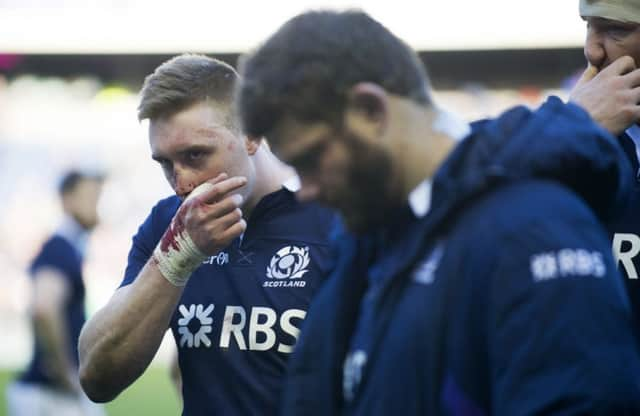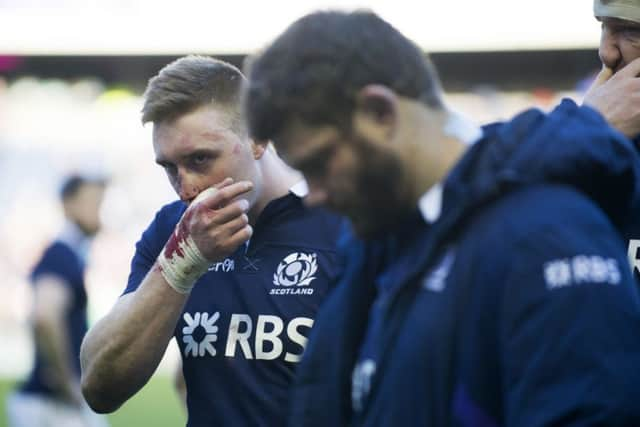Iain Morrison: Scotland wounds were self-inflicted


It did and at a fair gallop. It is too simplistic to say that Paul O’Connell’s fifth-minute try settled this game but it would have elicited all those “here we go again” thoughts in the home team players who were already struggling for confidence.
After the match, Scotland coach Vern Cotter kept mentioning the many things that his side can do to help themselves and keeping 15 men on the field for 80 minutes is imperative. Only against England did the Scots manage that not-so-simple task. Throughout the tournament, discipline was appalling and, for every smart penalty that the Scots conceded – Johnnie Beattie’s yellow card in Paris probably prevented seven points – they would gift the opposition a soft and simple three points. Blair Cowan’s opener against Wales would be a hanging offence if we still had capital punishment.
Advertisement
Hide AdAdvertisement
Hide AdGreig Laidlaw’s first box-kick against Ireland wasn’t a bad effort but Rob Kearney fielded it safely enough, partly because Stuart Hogg wasn’t able to challenge due to green shirts getting in the way. Two phases later, Conor Murray replied in kind and, this time, Laidlaw nudged the charging Luke Fitzgerald off the ball to concede a needless penalty. It is cynical to say so but Scotland must get better at cheating and Ireland are the masters in that respect.


As the underdogs, Scotland rarely, if ever, get the benefit of the referee’s doubt so they have to work twice as hard to get in his good books. Against Wales, Finn Russell challenged (or rather didn’t challenge) Dan Biggar in the air and got a yellow card for his trouble that was later ramped up to red. Irish centre Jared Payne tackled an airborne Adam Ashe at a restart on Saturday and got away with a penalty. Hopefully, John Jeffrey, World Rugby’s referee coordinator, is noting these absurd aberrations in the way the laws are applied.
Scotland’s backs show plenty of ingenuity and ambition in attack but they also exhibit a collective myopia in defence. The Irish backs looked as though they could find holes in Scotland’s defence, mostly in the wider channels, where they seemed to enjoy a overlap almost every time they moved the ball, especially in the chaotic opening exchanges.
Dougie Fife has brilliant footwork and good gas but his defensive decisions don’t bear much scrutiny. In the move that earned Ireland field position for O’Connell’s early try, the right winger had raced into the middle of the field, halfway between the two touchlines, when he would have made a tackle but for an unfortunate slip. He can’t be blamed for losing his footing but, even if Fife had remained upright, Ireland still had two or three attackers outside the Scotland winger.
From the resulting kick-off, Ireland move the ball to the left, Fife was caught 30 yards from his touchline and, this time, two Irish attackers outflanked him.
Eleven minutes into the game, Ireland won a turnover on their own 22 and moved the ball left. This time, Fife occupied the wide channel but he was 30 yards too deep and did not close down the Irish attack until they were well beyond the gain line. I don’t mean to pick on the poor man but there were three costly mistakes with the game hardly started.
He wasn’t the only one because, time and again, Scotland’s decision-making was at fault. The back row failed to compete at the tail of the Irish lineout so gifting Sean O’Brien the first of his brace. Various little grubber kicks were put through that only served to give possession away and numerous players were tackled into touch when they did not need to be.
Part of Scotland’s problem is that they don’t have too many ways to get to a grip on a game.
Advertisement
Hide AdAdvertisement
Hide AdIf their wide attacking game can’t find a rhythm or get the go-forward ball it thrives on, there is little else to fall back upon. Greig Laidlaw’s kicking from hand has been as wayward as his shots off the tee have been on the money. Russell’s first instinct is to run when, just occasionally, he might be better advised to look for space down town and Scotland’s driving maul has ground to an ineffectual halt.
The good news is that Scotland are not 30 points worse than Ireland. Some matches simply run away from one side and that is what happened on Saturday. As Cotter claimed, many of the wounds are self inflicted. Scotland’s players must cut down on the unforced errors and make the opposition sweat blood for every point.
Cotter has work to do but, at least ahead of the World Cup, the squad could be bolstered by the return of Grant Gilchrist, Richie Gray, Ryan Wilson, Josh Strauss, WP Nel (if the South African shakes a leg), Duncan Weir, possibly Alex Dunbar, Sean Maitland and, who knows, perhaps some of the old stagers who have been given an early bath.
FOLLOW US
SCOTSMAN TABLET AND MOBILE APPS